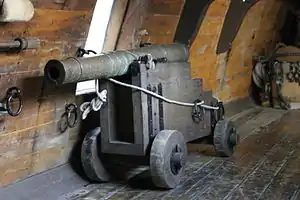A wide variety of gunpowder artillery weapons were created in the medieval and early modern period.
List
| Name | Image | Notes |
|---|---|---|
 |
A long, narrow 15th–16th century cannon[1] | |
.JPG.webp) |
First recorded use in 1326, made of brass.[2] | |
| A long-range cannon, first mentioned in 1410[3] | ||
| A type of cannon with a short barrel.[4] | ||
 |
A medium cannon, smaller than a culverin | |
| A 3-pounder cannon; alternatively, an adjective to describe a lighter variant of another cannon.[5] | ||
 |
A light cannon | |
| A small cannon used in the 16th and 17th centuries | ||
| A large naval cannon | ||
 |
A medium cannon firing a 5 to 8 lb shot[3] | |
| A cannon similar to a culverin[3] | ||
 |
A long, narrow 17th century cannon[1] |
Bibliography
- Artillery: An Illustrated History of Its Impact, Jeff Kinard.
- English Civil War Artillery 1642-51, Chris Henry, 2005, Osprey: Oxford.
- Science and Civilisation in China: Military technology: The gunpowder epic, Joseph Needham
References
This article is issued from Wikipedia. The text is licensed under Creative Commons - Attribution - Sharealike. Additional terms may apply for the media files.